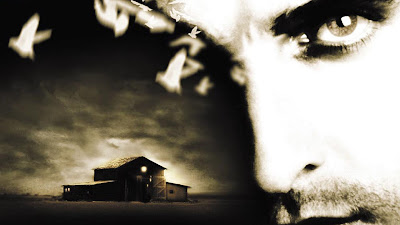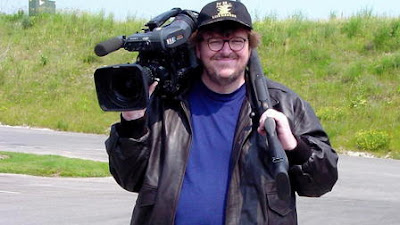Showgirls kill their cheating lovers and claim to have never remembered it happening. Innocent and naive showbiz hopefuls shoot people who fail to deliver on the promise of a spotlight. Cellblock wardens supply inmates with all sorts of privileges and furnishings at a very steep price. Hotshot lawyers promise acquittal of any crime at an even steeper price. And crazy women convicts compete for press attention like rival celebrities drunk on media buzz, fearful of up-and-coming murderesses who could potentially outdo their own elaborate streaks of crime. Ladies and gentlemen, welcome to Chicago—the city that never shuts up.
Friday, January 31, 2003
Darkness Falls / ** (2003)
"Darkness Falls" is a movie about every familiar idea and plot technique that has ever been seen in a horror film, stretched by lots of dark moments of swift and incoherent action and a soundtrack loud enough to keep even those who would like to doze off wide awake for the halfhearted thrill ride. Depending exclusively on countless endeavors of the past to emit its energy, the picture would serve as a worthwhile experience only to those who have never seen a horror movie in their life. Here, characters tend to walk through scenes like they're being warned of impending danger, and then are captured and crushed by an unseen flying spirit almost on cue, as if it's all supposed to be genuinely scary.
Final Destination 2 / *** (2003)
"Who would have thought death could be so funny?" That was the initial reaction of a friend and colleague following the promotional screening of "Final Destination 2," the follow-up to the very successful 2000 horror flick in which seemingly normal teenagers were unwittingly dragged into a giant tug-of-war with the maddened fates. What makes her quote so precise is its spot-on accuracy for us as observers; for nearly the entire 100-minute running time, characters conveniently get caught up in superstition, wander into death traps and spin themselves away from the obstacles before they're ultimately done away with via gruesome—but wildly laughable—means. The thought of bodies being sliced and diced like food dishes here should be a horrifying one, of course, but the movie doesn't want to emerge with that attitude. On most occasions, in fact, the material is even silly enough to supply a payoff far greater than most recent comedies.
Gangs of New York / ***1/2 (2002)
Martin Scorsese's "Gangs of New York" is a movie alive with greatness at several cylinders, a vibrant and challenging period drama that utilizes history, politics, intrigue and violence on the seams of a thoughtful narrative about the dark side of humanity. We've been taken to places like these often by Scorsese—stories that deal with characters who emerge from the shadows to take on the world around them—but seldom have they been structured with such painstaking precision or such compelling range. As you watch it unfold, you find yourself understanding exactly why the man behind the camera remains such a significant influence in modern cinema. This isn't just a movie you watch, after all, but one you experience.
The Recruit / *1/2 (2003)
The mind game can be a great asset to any movie that chooses to apply it correctly, but when it's labored beyond measure and plausibility, the result is a product like "The Recruit." Here is an espionage thriller with about as much intrigue as all 20 James Bond films combined, an endless and shapeless mess that spends so much time on pulling rugs out from underneath us that it has no desire to accomplish anything else. In the process, characters lose their stamina, specific plot ideas are deserted and potential scenes of action or confrontation become anticlimactic; in general, it's as if the movie is in some kind of elaborate guessing game simply for the sake of confusing its observers.
Friday, January 17, 2003
The Best and Worst Films of 2002
The task of ranking the ten best movies of any year, most will gladly tell you, represents the most difficult challenge in the career of a movie journalist. As faithful messengers of the cinema, we spend 12 months slogging our way through countless major theatrical releases, struggling to uphold a degree of professionalism even during periods of bleak outlook, only to have it all thrown back into our face in the final weeks of the year before we have to start the process all over again.The effort is sheer madness on many levels and utterly tiresome on others, sometimes seeming rather pointless in the grand scheme of things. But then again, how else could us writers bring closure to the past before moving on into another pool of releases?
Friday, January 10, 2003
Adaptation. / ***1/2 (2002)
"Adaptation" is a film about the making of "Adaptation." Confused? Of course you are. But fear not, as this is exactly the kind of response that the movie expects you to have, if only for the first few minutes that it is on screen. It's about Charlie Kaufman, the writer of this movie and "Being John Malkovich," as he struggles to adapt a novel called "The Wild Orchid" into a screenplay (which is where this movie, the opening credits indicate, is adapted from). Failing miserably in his initial goal, he decides to shift the focus of his opus onto his own writing dilemma, putting himself into the story of "Adaptation" so that the literal result is the audience experiencing him during the writing of his own script. Get it?
Bowling for Columbine / ***1/2 (2002)
Ever since a group of teenagers descended the halls of a high school in Colorado on April 20, 1999, the subject of violence has been a painful and sometimes sluggish debate among the inhabitants of modern society. A legacy that initially founded the United States of America to begin with, violence has always been imbedded in the public's psyche, persisting even in times when the fear of it was much greater than the actual threat itself. But to what extent does that trait manifest into a living beast and consume its host? Does the media provide an easy outlet for it to take charge? And whose to say that any specific person or event is to cause for it unfolding? Columbine forced us to consider these difficult questions extensively, although we still aren't any closer to appropriate answers.
Far From Heaven / *** (2002)
It's amazing the lengths some have gone to in their praise of one of the year's most glossy disappointments. Todd Haynes' "Far From Heaven" is a biting and gorgeous social commentary saddled somewhere between dramatic brilliance and narrative miscalculation, struggling to keep a balance even when things start to spill drastically over the restriction. It is a very uneven effort that left me feeling incomplete on several levels, as if crucial points of justice weren't furnished completely or were simply abandoned just when things started to build up. Haynes assumes that the familiar plot conventions can be excused since they unfold in the 1950s, and in many regards he is brave for attempting the clash. But not everything takes off the way it should because the formula refuses to be entirely merged to the era. The script doesn't even treat the material like it belongs in this specific period; it's more like a series of afterthoughts that have merely been punched up for a very different kind of time warp.
Secretary / *1/2 (2002)
The experience of watching "Secretary" is perhaps more amusing than anything actually contained in the movie itself. What begins as an innocent exhibit of blank but intrigued stares quickly and effortlessly becomes a sea of twisted faces, confused eyes and disjointed smiles, exemplified by a crowd of film observers who no doubt feel like they've walked into some kind of sexual twilight zone without actually being told so. Just a quick glance at any person during the halfway point of the picture is enough to endure the on-screen torture, although just barely. And by the time its all over, the only thing that remains even remotely interesting in our minds is the fact that people can make their faces look so mutated.
Subscribe to:
Posts (Atom)










